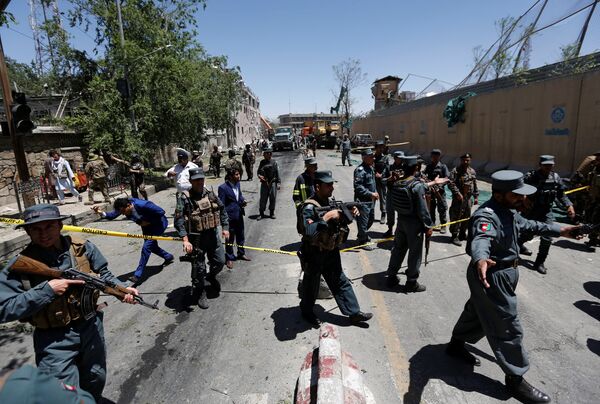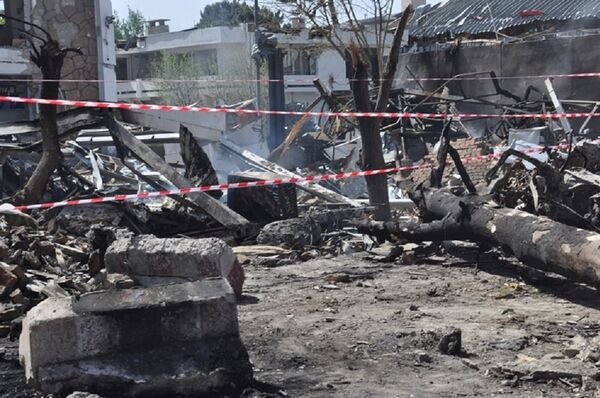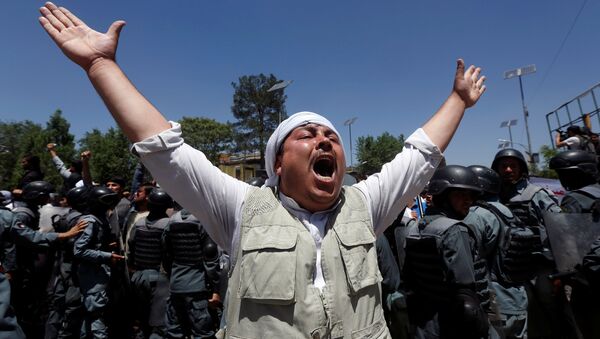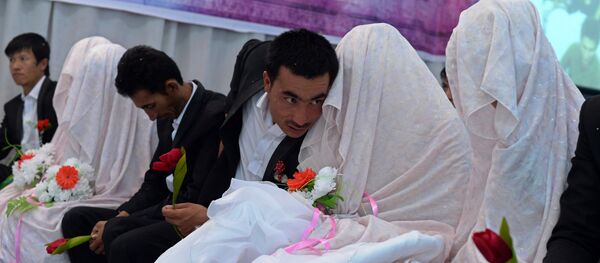A Brief History
In understanding the tragedy to befall this ancient landlocked Central Asian country, a part of the world that Alexander the Great struggled to pacify with his Macedonians as far back as 330BC, you have to understand the importance of its geostrategic location, making it a de facto land bridge between Central Asia and the Middle East. In ancient times it was a key point on the Silk Road ancient trading network and a major migration route for people and peoples moving across Asia.
In the 19th century Afghanistan was the feature of the Great Game between the competing British and Russian empires over the protection and expansion of their colonial possessions in Asia and beyond. In terms of its development, Afghanistan remained untouched by the industrialization which swept through the Indian subcontinent as the British mercantile class set about the wholesale plunder and exploitation of India's human and natural resources. By contrast, Afghanistan's value to the British was solely strategic. Combined with a paucity of natural resources and the country's rough, mountainous terrain, difficult to traverse, it remained locked in a state of perennial underdevelopment. A primitive agrarian economy predominated, supporting a feudal system of social relations that has continued in the countryside in one form or another up to the present day.

The People's Democratic Party of Afghanistan (PDPA) was formed in 1965 in opposition to the autocratic rule of King Zahir Shar. In 1973 a palace coup led by Mohammed Daud, the king's cousin, succeeded in toppling the king from power. In the years following, Daud sought to distance himself from the PDPA and from the Soviet Union, which was Afghanistan's biggest trading partner and source of aid throughout the 1970s. In 1978, when Daud's intention to purge the army of its communist officers and cadre became known, he himself was the victim of a coup staged by the PDPA with the support of the Afghan army.
The forced removal of Daud enjoyed popular support in Afghanistan's urban centers, with John Pilger reminding us of how the Wall Street Journal reported at the time that "150,000 persons marched to honor the new flag," while the Washington Post reported that "Afghan loyalty to the new government can scarcely be questioned."
The new government introduced a program of reforms designed to abolish feudal power in the countryside, guarantee freedom of religion, along with equal rights for women and ethnic minorities. Thousands of prisoners under the old regime were set free and police files burned in a gesture designed to emphasize an end to repression. In the poorest parts of Afghanistan, where life expectancy was 35 years, and where infant mortality stood at 1 in 3, free medical care was provided. In addition, a mass literacy campaign was undertaken, desperately needed in a society in which 90 percent of the population could neither read nor write.

"Kabul's two [university] campuses thronged with women students, as well as men. Most went around without even a headscarf. Hundreds went off to Soviet universities to study engineering, agronomy and medicine. The banqueting hall of the Kabul hotel pulsated most nights to the excitement of wedding parties. The markets thrived."
US Covert Support for Mujahadeen and Soviet Intervention
The Afghan government's attempt to drag the countryside out of the semi-feudal condition met with determined resistance, however, on the part of tribal chiefs and their supporters, people wedded to an ultra-conservative way of life untouched by modernity and rooted in puritanical Islamic nostrums. This resistance to the Kabul government's reform program attracted US covert support and funding, as Washington took the opportunity to subvert a country whose government enjoyed a close friendship and alliance with Moscow. This US support began under the Carter administration.
An initial US$500 million was allocated, money used to arm and train the rebels in the art of insurgency in secret camps set up specifically for the task across the border in Pakistan. This opposition came to be known as the Mujahadeen (which roughly translates to "those engaged in jihad"), and it embarked on a campaign of murder and terror so brutal that, six months later, the Afghan government was forced to request military assistance from the Soviet Union. What resulted was a well-intentioned but ill-fated military intervention, one that ended ten years later in the departure of Soviet military forces and the descent of Afghanistan into the abyss of religious intolerance, abject poverty, warlordism and the unremitting violence that has plagued the country ever since.
The point worth emphasizing here, however, is that contrary to the Western narrative of the period, the Afghan Mujahadeen did not arise in response to a hostile Soviet invasion of the country, but rather the Soviet Union intervened at the request of the Afghan government in response to the instability being wrought by a US funded and armed insurgency. As to the question of why the US would arm, fund and train an insurgency comprising religious fanatics in Afghanistan, the answer is, for the same reason successive US administrations have armed, funded and trained insurgents and death squads in any part of the world where progressive, secular and left-leaning governments have attempted to institute social and economic justice — namely to halt the spread of a good example.
Oil, Pipelines and a Failed Experiment in 'Nation-Building'
The demise of the Soviet Union meant that the huge deposits of crude oil located in the Caspian Sea were suddenly up for grabs. What US and Western energy corporations required was a pipeline to transport this crude to the nearest friendly port from where it could be shipped out. Iran wasn't an option, which left Afghanistan as the only viable alternative — with the proposed pipeline configured to pass through and on into Pakistan to the port of Karachi on the coast of the Arabian Sea.
Returning to John Pilger, we learn that:
"…in 1996, when the Taliban took power in Kabul, they found themselves courted by the American oil lobby with its eye on one of the great prizes of the twenty-first century."
He reveals that according to the UK's Daily Telegraph:
"Oil industry insiders say the dream of securing a pipeline across Afghanistan is the main reason why Pakistan, a close political ally of America's, has been so supportive of the Taliban, and why America has quietly acquiesced in its conquest [of the country]."
In fact, so important was this pipeline to the US that in 1996 a high level Taliban delegation flew over to meet with Unocal executives at their headquarters in Houston, Texas to discuss its construction. The governor of Texas at the time was none other than George W. Bush.
Despite ruling a country in which women were stoned to death for adultery, in which men were tortured and had their limbs amputated for misdemeanor crimes, in which music and television was banned, in which it was illegal for girls to attend school, these high-ranking representatives of the Taliban were given the red-carpet treatment, put up in a five-star hotel and even accorded a VIP visit to Disney World in Florida. However, after they left, it was concluded that they couldn't be trusted as partners in such an important undertaking, whereupon the plan for the pipeline was shelved.
With 9/11 came the opportunity the US "oilocracy" had been waiting for to achieve their long-held ambition of establishing an Afghan pipeline. It was an opportunity that undoubtedly added impetus to the invasion that was mounted to clear the country of former US allies like the Taliban and Osama bin Laden.
Horrific Kabul bombing a grim reminder of civilian casualties in Afghanistan, reaching record levels this year https://t.co/VvWJFofXup pic.twitter.com/DDKQ3absRD
— Human Rights Watch (@hrw) May 31, 2017
The result, 16 years on, is a country and society mired in brutal violence, terrorism, corruption, and instability. Indeed, by any objective measure Afghanistan in 2017 is a failed state in which Daesh now has a presence, in which the Taliban is resurgent, and where, according to Human Rights Watch (HRW):
"Fighting between the Taliban and government forces continues to have a devastating impact on civilians, particularly children. Thousands of civilians were killed and injured in 2016 in insurgent suicide and improvised explosive device (IED) attacks, while indiscriminate aerial and mortar attacks by government forces added to the civilian toll."
The HRW goes on to reveal that:
"The number of internally displaced people reached at least 1.3 million in 2016. Political infighting has slowed government reforms, and there has been little measurable improvement in women's rights, accountability for torture, or curbing attacks on the media."
Such is the fate to befall a country that in a very real sense was used as a laboratory for a failed experiment in "nation-building" by Western ideologues suffering from a chronic case of imperial arrogance and grandeur, leaving in their wake a legacy of chaos and carnage.
The views expressed in this article are solely those of the author and do not necessarily reflect the official position of Sputnik



